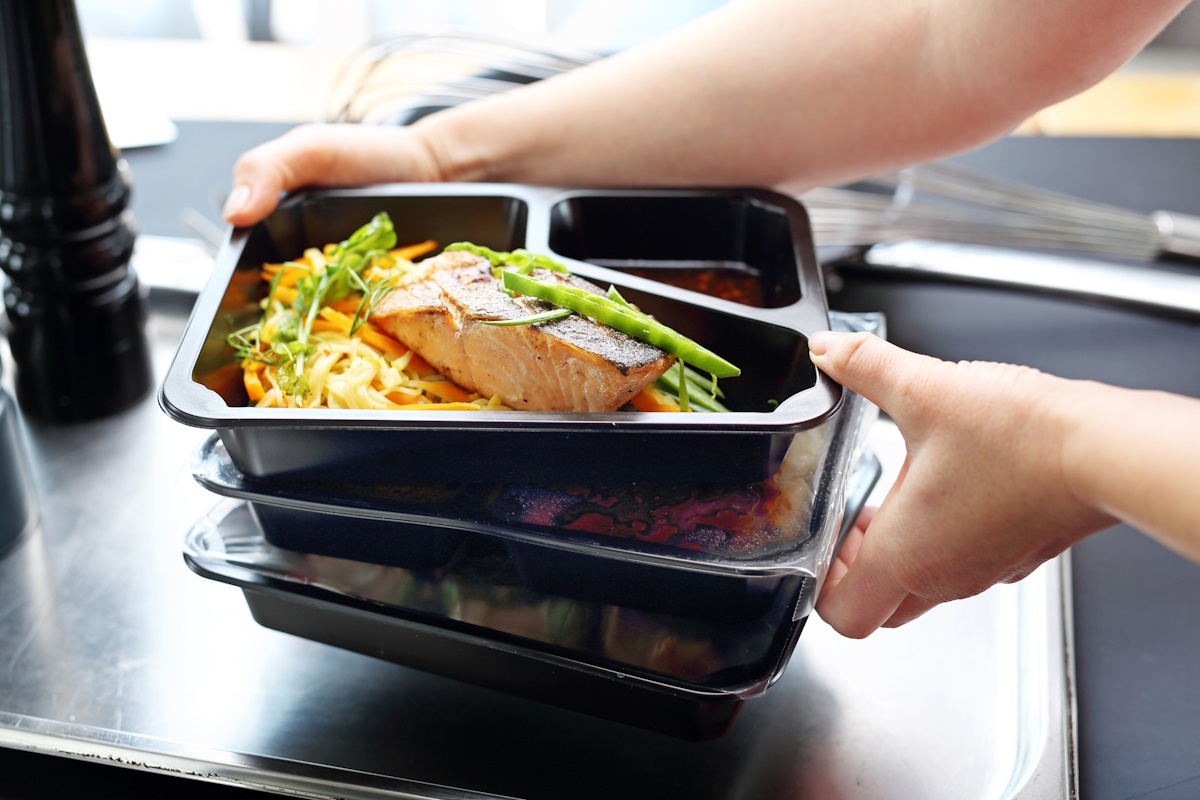In times like these, a restaurant is an entity that operates as a high-profile stage: for beautiful dishes, dedicated makers, passionate chefs and all kinds of food trends. The catering industry, on the other hand, cannot offer up this type of performance or make a major publicity splash. After all, the food is planned in offices, produced in commercial kitchens and delivered to companies, events or airlines in the end. This makes caterers less visible for consumers and the media. And that’s precisely why we tend to talk less about them than we do about celebrity chefs and their restaurants.
However, with a global turnover of around USD 300 billion per year , it is a highly relevant player in the foodservice industry. And what’s more: The catering industry plays a major role in determining how and what we all eat, since without it, the vast majority of communal catering is simply not possible. And when we say communal catering, we often mean the only hot meal that the majority of employees eat each day – at least in the large industrialized nations.
The catering industry is doing just as well as the restaurant industry: Since the pandemic, no stone has been left unturned. And all this despite – or perhaps because – catering companies already had to cope with many changes, such as climate change, technical revolutions, price increases and the shortage of skilled workers. But what exactly are the biggest challenges in the catering industry? How is the industry really doing according tocatering experts? Where is it headed? And what can it do to stay fit for the future?

Image: AdobeStock
Catering industry challenges are all related
The point here is, caterers have a lot in common. Whether they are large or small, they are all affected by the great challenges of our time to a greater extent than is the case in traditional gastronomy. This is because the catering industry is such a multidimensional construct. Sure, it has to be tasty, good and healthy – and preferably creative as well. However, there are also operational issues: How do you source quality goods in such large quantities that are also sustainable? What can you do to optimize processes in times of skyrocketing prices? If you delve deeper into questions like these, it becomes both fascinating and surprising that seemingly unrelated fields are more closely interlinked in catering than in many other industries. For example, topics such as sustainability and young talent.
Expert tips: Skills shortage and sustainability in catering
Let’s get straight to the point: Yes, there is a lot of potential in the technological achievements of the last five years within the industry. However, no caterer can do without competent, motivated employees, even in the long term. “At the latest since the coronavirus pandemic, the shortage of skilled workers has become one of the biggest challenges in the industry,” says Lloyd Mann, Global Executive Chef of Sodexo, one of the world’s largest and most important caterers.
More than 100 million people are served by Sodexo in over 53 countries – every day! So what could be done? In this case, specific approaches taken by such a renowned catering experts from the front line are particularly valuable. “In my opinion, there are two highly relevant points when it comes to tackling today’s skills shortage as a catering company. In other words, to get young people interested in our company. First of all – and this applies to all caterers – we must make a conscious effort to free up resources to provide young people with opportunities for development. You have to experience what it means to grow with and thanks to a company.
Second, sustainability also plays a role here. Young people today want to know where the food their company serves comes from. They question this. That’s why sustainable food is about all of us.” Indeed, if you take a closer look, you’ll see that few players in the food service industry have such in-depth thoughts about sustainability or resource-saving food. However, these days it’s about more than just vegetarian dishes that leave the smallest possible ecological footprint thanks to plant-based foods. This involves so much more.

Image: Shutterstock
Catering experts: Nothing works in catering without intelligent systems
Oliver Fischer, Director Culinary Excellence at Gategroup, the world’s largest airline caterer, is a clear example of this statement. The Swiss-based group serves over 700 million passengers a year in 60 countries. “And that’s supposed to be sustainable?” you might ask. The point here is, people are flying, and these people should be well cared for. For years, Gategroup has been committed to making catering as sustainable as possible –which in turn makes aviation itself more sustainable. “Catering chefs are not part of the problem, but rather part of the solution,” Fischer sums it up.
As a prime inter pares, the Group also shows what an important lever the catering industry represents. “Today, it’s about more than just offering good value when it comes to food,” Fischer says with conviction. This makes it clear that the technological achievements of recent years can make the industry better and more sustainable. Besides serving less meat, the main focus is on operational efficiency. “It’s clear to us that we need data to be able to operate more sustainably,” says Fischer. “In the past, you simply bought everything you could get, cooked it and put it on the plane so that there was as much food as possible for the passengers. But with the right data, we now know which culinary preferences apply to which flights and which meals work best where. This means that we can produce in a more targeted and streamlined way – and in doing so, avoid food waste. This alone means that we generate over 20 percent less waste,” says Fischer.
What applies to major airline caterers is just as essential for other catering companies. A target-oriented breakdown of a field as complex as catering can make many things easier. If only it wasn’t so difficult. Because here too, many things are closely intertwined. After all, reducing food waste is not only good for the climate – it also saves money and resources. And that’s precisely why intelligent software is essential for any catering business in times like these.
Catering experts: Prices are not the only answer to the challenges of the catering industry
“Production costs have risen in the wake of various crises, but raising prices as a result cannot be the only solution,” says Carl Jacobs, CEO and co-founder of Apicbase. This is one of the leading F&B management software solutions that optimizes production processes by creating a central data system for companies. Besides food waste, we can also tweak other aspects so that the catering industry can remain profitable in times of war, inflation and high energy prices – even if that sometimes seems impossible.
So, how can this be done? “By not only using sales figures as a measure, but also actual profit margins,” says Jacobs. “In our software, for example, a company can centralize its entire back-of-house system. This means everything from recipes and working hours to food inventory and invoices are linked to each other. Admittedly, this is difficult at first because it completely reorganizes the structure of a company. However, experience shows that this optimizes many old processes and has been proven to increase profit margins.” But is all of this really compatible with the increased sustainability requirements of the industry itself? Jacobs is certain this is the case. “Not only are they compatible, they are actually mutually dependent.”
Technology in response to the challenges of the catering industry
This is also underlined by Martin Wolf, Segment Director Catering at Rational. The achievements in the field of kitchen technology show that sustainability and efficiency go hand in hand. “Rational’s energy-efficient steamers are becoming increasingly important in many catering kitchens compared to traditional gas and charcoal grills,” says the catering expert. “The latter not only emit more CO2, they also increase the time spent by employees in the kitchens, who, as we know, are simply too few.”
Intelligent cooking systems such as the iVario or iCombi, on the other hand, know what they are doing – and allow leading chefs to be creative by saving time. Developing new vegetarian or vegan recipes in particular takes time. And this time can be a worthwhile investment, since virtually every caterer confirms the demand for vegetarian dishes has been on the rise for years.
The promising thing about it: Vegetarian dishes are usually cheaper to prepare, even if they are high quality, because the cost of goods is generally lower than for meat dishes. That’s also what we’re all about in the catering industry: great, high-quality food. Despite all the challenges mentioned, this must not be forgotten. But here’s the thing: Even more than the restaurant trade, the catering industry shows that when it comes to good food, it’s actually about so much more. About complex work processes. Lots of jobs. Technological progress. Sustainability and the health of millions of people. Seeing all this as an opportunity to make the way we eat and what we eat more sustainable and ethical is undoubtedly a great achievement of the catering industry. And if we believe the experts, this will remain the case for the foreseeable future.
Would you like to find out more about the current situation and the challenges facing the catering industry? Then watch Rational’s unique catering TrendTalk in full length here:














